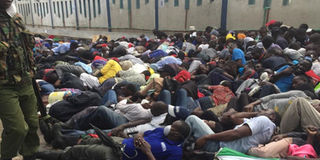Police are the weak link in fight against coronavirus

Police victimise Mombasa residents, at Likoni ferry channel, just hours before the start of nationwide curfew to curb spread of coronavirus on March 27, 2020. PHOTO | FILE | NATION MEDIA GROUP
What you need to know:
- Their mentality is that of projecting authority solely by force. If they don't get restrained during these days of curfew, they could very well provoke riots in the slums.
- I think sackings should be the more appropriate disciplinary measure given the gravity of the situation.
Something drastic needs to be done about the Kenya Police.
The transformation needs to start right from recruitment. Doing press-ups and running shirtless doing laps across a field should not be the measure of suitability of recruits.
Let mental subtlety and aptitude be the yardstick. It was a massive disappointment to witness the wanton behaviour of the police when the Kenyan anti-corona curfew was coming into effect a week ago.
The brutality in Likoni and other places was beastly. It was a stark demonstration that the police reforms trumpeted some years ago have not had much beneficial impact.
This problem is usually displayed in the lower ranks, who lack the instinct to handle the public with decency.
It should have been apparent that this mindless violence will only hinder the campaign against coronavirus.
All the police need is to apply basic common sense. The public are not wild animals. They respond better to persuasion and tact than to truncheons and 'rungus'.
CURFEW EXEMPTIONS
At Likoni, the police claimed the crowds became unruly. But what do you expect when no proper crowd control plan has been put in place?
In any case, when a crowd becomes unruly, it is inexcusable for the police to similarly respond in an unruly fashion.
That is why they are supposed to be a disciplined formation. That, presumably, is why they undergo training.
The scenes across the country were truly depressing. It was evident that before the policemen swang into action with their batons, they had not read and understood the relevant Legal Notice that instituted the curfew.
In that notice, several cadres were expressly exempted from the curfew restrictions. Health workers are obviously exempt, yet we saw on TV a doctor at one location getting whipped by police despite having his documents.
In Nakuru, a lorry driver transporting farm produce was also stopped and brutalised. Yet being a transporter of essential food supplies, he, too, was subject to curfew exemptions.
The extent of police indifference hit me when the police spokesman, Charles Owino, was being interviewed by the media on the first night of the curfew.
DISCIPLINARY MEASURES
Effecting a light touch, he mentioned that they were not supposed to be out and about at that hour. Yet the same Legal Notice says in black and white that broadcasters are exempted.
In Kwale, a 'boda-boda' man who had just dropped off a pregnant woman to hospital was alleged to have been clobbered by police for breaching the curfew.
His kin claimed he later died of his injuries. The police denied the claims, even as a local sub-county commander, Francis Mguli, promised to investigate.
Police bosses are known to get particularly touchy when they are blamed for fatalities. There was another reported incident of a 13-year-old boy who was killed by a stray bullet alleged to be from a police officer "enforcing" the curfew in a Nairobi slum.
The police hierarchy has responded by handing out interdictions to accused servicemen. I think sackings should be the more appropriate disciplinary measure given the gravity of the situation.
The Law Society of Kenya has in the meantime gone to court to complain of police conduct during the curfew.
POOR TRAINING
Policemen in other African countries seem to revel in this selfsame attachment to crude and heavy-handed tactics.
Gosh, could it be something innate? In South Africa, which is under lockdown, security forces tear-gassed matronly nurses demonstrating for safer personal protective gear in hospitals. It was quite unnecessary.
I have never been impressed by arguments that since policemen are underpaid and are housed in rough quarters, this makes them unusually prone to stress which translates into very ill-mannered treatment of civilians. This is silly.
It's the same argument we hear that judges need to be better paid to dissuade from corruption. Better how?
The problem with our policemen is that, with the enormous powers the law delegates to them, their trainers never sufficiently instil in them the imperative of interacting with civilians in a civilised and humane way.
Their mentality is that of projecting authority solely by force. If they don't get restrained during these days of curfew, they could very well provoke riots in the slums.
HUMANE TREATMENT
Still, there were images of kindness from some members of the service. One officer in Kabarnet, who was in admirably good cheer, was seen dispensing sanitiser liquid to drivers who had by some misfortune gotten caught up by the curfew.
Rather than act cruel and arrest them, he gently but firmly advised them not to be late again.
An even more endearing image was that of a policewoman helping carry a bag for a lady who had a child on her arms.
That photo, which went viral, should grace the wall of every policeman's office and living room.





